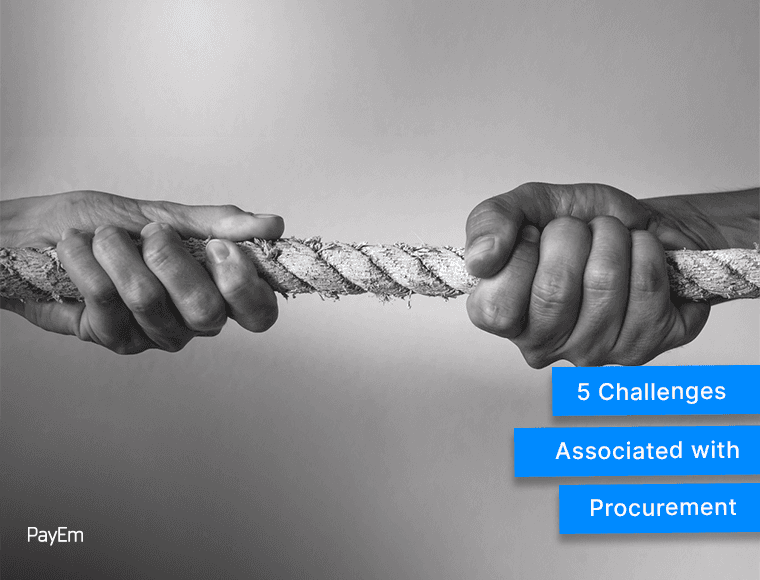November 03, 2022
5 Challenges Associated with Procurement

Sign up for our newsletter
Stay informed with the latest trends and best practices in finance and procurement.

There are no two ways about it - procurement is fundamental to continued business operations and success. Obviously, businesses that are vertically integrated to an immense degree are exempt from that statement, but that still leaves the vast majority of businesses presently maintaining operations.
However, just because procurement is crucial does not mean it’s easy. In fact, for those not in the know, procurement possesses several challenges and pitfalls for the unwary. That’s why we’ve gone ahead and outlined several of the challenges associated with procurement, listed below:
This article will cover the following topics:
- What challenges are associated with procurement?
- Dark Purchasing
- Transparency
- Data Accuracy
- Handling Risk
- Adopting Fintech Solutions
1. Dark Purchasing
Dark purchasing is a procurement challenge that arises due to insufficient procurement planning. More specifically, dark purchasing refers to uncontrolled spend that falls outside a company’s procurement processes. Given that these purchases are unplanned, dark purchasing may have wide-ranging ramifications on budgeting and inventory. Hence, comprehensive procurement management can reduce such outlying actions.
2. Data Transparency
Data accessibility and analysis are key to strong procurement management. However, as procurement processes mature and expand, data systems tend to grow increasingly opaque and more challenging to access. In turn, this can lead to lagged data updates, leading to disadvantageous negotiation positions and compromised vendor relationships. Businesses can avoid this challenge by establishing data transparency as an early priority and building scalable storage and retrieval processes.
3. Data Accuracy
Though “acting on one’s gut feelings” sounds snappy, successful businesses act based on data-sourced conclusions. However, for data-based decision-making to yield desired procurement results, the data itself must be accurate beyond a shadow of a doubt. A lack of data accuracy poses a challenge to procurement processes since errors can lead to mismanaged inventory, budgets, and contracts.
4. Handling Risk
Though true for businesses of all sizes, those with extensive, interconnected, and integral procurement strategies are particularly vulnerable to risk. In this case, the risk is that if one vendor falls through or one deliverable experiences delay, the company’s whole procurement network falls apart. This potential challenge is why businesses must plan for contingencies while ensuring all relevant stakeholders remain on the same page regarding policies, compliance, and failsafe methods.
5. Adopting Fintech Solutions
No matter what they say, change is never easy. The best time to implement processes is at their nascency, though that rather defeats the purpose of change. Notably, when corporate procurement systems are large and complex, changing their underlying systems can appear challenging, if not outright impossible.
That said, with the advent of financial technology in recent years, there are now a swath of modern procurement solutions available that are worth considering. In fact, companies and procurement teams that are not iterating their procurement solutions are falling behind their competition and departmental counterparts.
That’s where PayEm comes in. With the platform’s procurement-based solutions, companies can connect their finance, sales, and procurement teams through methods previously unimaginable. Moreover, with a complete vendor management feature suite, along with analytics, policy integrations, and custom approval flows, many of the challenges facing procurement can be circumvented entirely. For a no-cost, in-depth walkthrough of the platform, be sure to contact PayEm’s experts.


